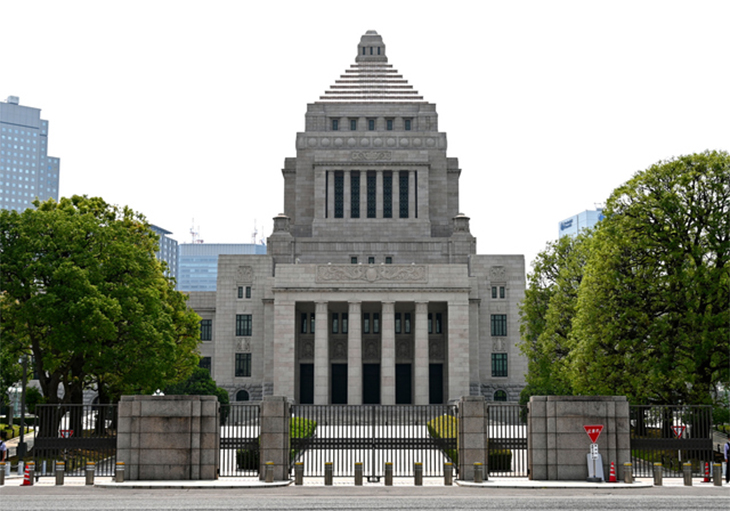Politics and Harassment: Why Aren’t There More Female Assembly Members?

Is the world of politics closed to women?
Photo: Miroku_9878 / PIXTA
Hamada Mari, Representative of Stand by Women
The big problem that came to light
Candidates are suddenly hugged while giving a speech on the street, are bombarded with slanderous messages, are yelled at by fellow assembly members, and rumors are spread they don’t know about themselves. These types of damages are cases that I often hear about when conducting harassment interviews with female assembly members. There are various factors behind the low number of female assembly members, one of which is harassment. In recent years, this issue has finally begun to receive attention in the media. The trigger is thought to be largely influenced by the report issued by the Cabinet Office (CAO) in 2021, which included a harassment investigation of assembly members, and the “Revised Act on Promotion of Gender Equality in the Political Field” enacted in the same year. This law made it mandatory for national and local governments, political parties, and other parties to make efforts to counter sexual harassment and maternity harassment, and media coverage of the issue increased rapidly. Progress has been made little by little in local assemblies to prevent harassment.
I have been thinking about increasing the number of female assembly members. With this in mind, at graduate school I conducted research on harassment of female assembly members and established Stand by Women, a support group for female assembly members and candidates. Additionally, in April 2023, together with volunteer members, I launched the “Harassment Consultation Center for Women in Politics,” which provides free consultations to female assembly members and candidates in preparation for the unified local elections.
Since 2021, when we started our activities, we have received interview requests from more than 100 media people. It is also worth noting that 90% of them were women. For example, women in the media who struggled in the field said things like, “My male sub-editor didn’t believe me, saying, ‘Can assembly members ever experience harassment?’ But I want to report on the reality.” I think that’s why it started to be covered in the media little by little. As in the political field, there is a large gender gap among decision-makers in the media. However, as this problem is resolved, new light will likely be shed on issues that have been made invisible.
Actual state of harassment towards assembly members
Assembly members are generally recognized as having a “strong position” because they can influence the welfare and lives of their constituents through policymaking, etc. However, as they interact with various stakeholders, including supporters, fellow assembly members, political party officials, and volunteer staff, they can become people in power, but in some cases, they can also be placed in a weak position. According to the CAO’s “Research report on barriers to women’s political participation” (2021), 57.6% of women and 32.5% of men answered that they had experienced harassment from voters, supporters, or other assembly members during political activities or campaign activities. Approximately 60% of women experience harassment. Of course, male harassment is also a serious problem. However, what I realized through interviews is that the quality and quantity of the damage suffered by women and men is different. Women are more likely to experience sexual harassment and are bombarded with messages and behavior that attempt to control them through lectures and other coercive attitudes. Additionally, women are more likely to be victims than men, and in some cases, they are being victimized on a daily basis.
In the same interview survey, 24.9% of women and 0.9% of men cited “gender discrimination and sexual harassment” as an issue from the stage of deciding to run to the election period, a difference of more than 20 points. Additionally, 34.8% of women and 2.2% of men cited “gender discrimination and sexual harassment” as an issue during their activities as assembly members, a difference of 32.6 points. This shows that women take discrimination and harassment more seriously than men and recognize it as a challenge.
When it comes to harassment perpetrators, in harassment surveys of assembly members, the results are often split evenly between fellow assembly members and voters. In a survey conducted by CAO targeting local assembly members nationwide in 2021, 46.5% were from fellow assembly members and 53.5% from voters.
Looking at the damage caused by harassment, when the perpetrator is a fellow assembly member, power harassment such as banging on a desk or yelling is very common. Sexual harassment, such as groping and forcible kissing, still exists. Characteristic to the political field, there is a lot of damage caused by slander and false rumors during elections. Moreover, since I started conducting this interview survey, I was surprised to hear many times that mysterious documents had been distributed. Harassment acts may be performed unconsciously and with no malice, or they may be performed for the purpose of harassment or during a political struggle, and there are various motives behind them. Additionally, it is not uncommon for the candidates to experience harassment while receiving official recognition from a political party, and they received multiple consultations during the unified local elections in April 2023.
Harassment—resistible demands from voters
There are various types of harassment from voters. Damage is particularly common during street speeches. In the cases I conducted interviews with, it seems that there are in fact fewer people who have never experienced such damage. Victims cite being groped, being abused, seeing people appear at every public speech like a stalker, and being persistently asked for their contact information. Other victims cite people calling themselves “official photographers” or “self-proprietary publicists,” taking multiple photos of female assembly members, and repeatedly asking them to shake their hands. These are nuisance acts that take advantage of the position of assembly members, who cannot campaign without the support of voters.
In addition, there have been cases in which volunteers and supporters who have approached candidates to help with election campaigns have asked for personal relationships in exchange for their help, or they have been stalked. In particular, candidates who have been elected infrequently tend to be understaffed, and when recruiting volunteers through websites and social media, it is common for the majority of applicants to be male. There are too many harassment damages from election volunteers. Some candidates asked volunteer applicants to submit their resumes, but they still had to consult the police after being stalked.
Also, when a woman runs for office and information about her candidacy becomes public, men often appear who call and say, “Let me be director of the election strategy.” They say, “I got that guy and this guy elected,” but in reality, they have almost no track record in elections. Moreover, I have heard of cases where they did not even know the necessary knowledge for elections, such as the Public Offices Election Act. Payment of compensation to election volunteers is not possible because it would be a violation of the Act. For this reason, it is difficult to refuse when a volunteer requests something, and a power relationship is likely to arise. In recent years, with the creation of the term “vote harassment,” harassment from voters has gradually come to be recognized. This refers to the act of using votes as a shield to try to control the candidates and to make various demands.
There is no end to enumerate the damage caused online. They have been slandered and seen rumors spread on social media, including messages such as “Do you have a boyfriend?” and “I want to go out with you,” comments about their appearance, sexual abuse, etc.[1]
Fear, regret…Voices of female parliamentarians
I have conducted interviews and provided consultation to several hundred assembly members and candidates, and I would like to introduce five phrases that I often hear.
The first one is, “I find the work itself rewarding as an assembly member, but there are too many sacrifices to make, so I can’t easily recommend it to other women.” One female assembly member said, “I feel sorry to be honest about what I’ve experienced, because it would make you think that you don’t want to be an assembly member.” She says the environment is too poor for women to work. It is essential to create rules and create an environment within assemblies and political parties that can deal with harassment in order to increase the number of female assembly members.
The second comment is, “It’s frustrating that it takes so much time to deal with harassment.” When you actually encounter harassment, it takes a lot of time to deal with it. Many people are faced with the dilemma of becoming ill due to the mental burden or being unable to do the work they wanted to do as an assembly member. I often hear people say things like, “I didn’t become an assembly member just to deal with harassment.” The same can be said for people who have been members of an assembly for multiple periods and are accustomed to dealing with harassment. A common opinion is that even if the damage is not that great, it is frustrating that it takes so much time to respond.
The third comment is, “I hope that by sharing this experience, we can stop the next damage.” Telling someone about harassment is not something you can do casually. However, when I asked them why they were cooperating with the interview survey, everyone said in unison, “Because I don’t want to pass on this problem to the next generation.” Most of them said, “If what I have to say is useful for that purpose, please use my words.” Just like the #MeToo movement that began in Hollywood, the testimonies of victims may be gathered together, supported by the will of each individual.
The fourth comment is, “Just talking about my experiences with harassment made me feel better.” Being an assembly member tends to put you in a situation where it is difficult to tell others even if you have suffered damage. This is because in the world of politics, where men are the overwhelming majority, it is difficult to accept showing weakness, or it is easy to get caught up in the idea that you don’t want to make your supporters feel anxious by showing your worries. In some cases, people are unable to speak up for fear of secondary damage. A big problem is that there is no place to go for advice. In addition, by raising your voice, you may be perceived in the assembly as “this assembly member is someone who tends to make a fuss about harassment,” and by expressing anger or rejection, you may create a negative impression among voters. There are many female assembly members who are concerned about this.
The fifth is a testimony that says, “Even if you suffer damage, people say, ‘You’re a public figure.’” This has the meaning of “As a public figure, it is inevitable that you will be subject to slander and harassment, so be patient.” It is commonly called “noblesse oblige,” and it is a word that can be thrown at celebrities as well, regardless of assembly members. However, being a “public figure” cannot justify being subjected to slander or harassment. Despite this, the current situation is such that there is a strong sense of oppression that “it’s natural for us to have to put up with this because we are assembly members” and “we should be prepared for harassment before becoming assembly members,” creating a situation in which it is difficult for assembly members to speak out about the damage caused.
On the other hand, even if you are in the same position as a female assembly member, if your position is hereditary, you will be less susceptible to harassment because you will have backing. In an interview, one assembly member who inherited her father’s electoral base said: “I could imagine that if something happened to me, my father would be contacted. Since I was a child, I had participated in my father’s political activities, so people around me recognized me as the ‘child of an assembly member.’ I think I was protected in comparison.” For assembly members, the fact that it is hereditary and has a strong base of relatives is considered to be advantageous from various aspects, not only in terms of name recognition and funding, but also as a deterrent against harassment.
Importance of establishing consultation desks
So, how can we respond to this current situation? According to the survey conducted by the CAO mentioned above (2021), the most effective measure against harassment for those considering or preparing to run for office is “establishment of a consultation desk (at political parties, secretariats of assemblies, etc.)” (49.6% for women, 44.0% for men), “awareness and training for voters, supporters, and members” (47.8% women, 46.8% men), “establishment of a monitoring organization” (46.8% women, 53.8% men). The most effective measures against harassment during parliamentary activities and election campaigns were “training for parliamentarians” (69.3% women, 61.3% men), “establishment of ethics rules to prevent harassment” (66.6% women, 57.6% men) and “setting up a consultation desk” (63.1% women, 52.0% men).
All of the initiatives listed here are necessary, but in this article I would like to discuss two points as countermeasures against harassment.
First, let’s talk about the importance of consultation desks. I would like to see the actual situation. According to a survey conducted by Kyodo News targeting 47 prefectural assemblies, as of November 1, 2022, four assemblies of Nagano, Gunma, Ehime, and Nagasaki Prefectures had established consultation services at the prefectural assembly level. At the municipal council level, according to the CAO’s 2022 version of the City, Town, and Village Women’s Participation Status Visualization Map, eight councils were confirmed: Ebetsu City, Hokkaido; Goshogawara City, Aomori Prefecture; Matsushima Town, Miyagi Prefecture; Tamagawa Village, Fukushima Prefecture; Higashimatsuyama City, Saitama Prefecture; Kita Ward, Tokyo; Ashiya City, Hyogo Prefecture; and Kamikatsu Town, Tokushima Prefecture.
Additionally, according to the Research Institute for Local Government (RILG), as of September 2023, local governments have enacted 33 individual ordinances regarding the prevention of harassment of employees and councilors. Six of these include Komae City in Tokyo, Ushiku City in Ibaraki Prefecture, Sannohe Town and Gonohe Town in Aomori Prefecture, Fukuoka Prefecture, and Osaka Prefecture. Considering the number of municipalities, of which there are more than 1,700, the consultation services are still far from being fully developed.
Although there are cases in which political parties have set up consultation desks for harassment, the overwhelming majority of local assembly members are independents and do not belong to any political party. During the interview survey, it became clear that even if a person belongs to a political party, it is not necessarily a situation in which he or she can feel safe seeking advice. Many female assembly members made the following comments: “The upper echelons of political parties are all male, so it is difficult to consult them if you think the final report will go there,” “The perpetrator of the harassment was in the party’s internal ethics review body, so it was difficult to consult in the first place,” and “I suffered secondary damage from someone I consulted within the party.” These stories show that even if a consultation desk exists, it will not work unless it is trusted.
In particular, the difficulty increases when harassment occurs within a political party. Even if they seek advice from internal consultation services, their official recognition may be revoked, they may be treated poorly within the party, or there are cases in which members of higher-ranking positions are shielding the offending party. Victims can assume this is the case, which is why they put up with it without making the damage public, because they don’t want to cause trouble within the party in order to continue their careers as an assembly member.
As the establishment of consultation desks is required by law, more and more private companies are establishing them. However, even if a consultation desk has been set up, the reality is that the number of consultations received there is quite low. According to the Ministry of Health, Labor and Welfare’s “Fact-finding Survey on Workplace Bullying and Harassment” (FY2020), 5.4% of companies used in-house consultation services after receiving power harassment, and 5.8% when it came to sexual harassment. Many people do not do anything even after experiencing power harassment or sexual harassment, and the most common reason for this is “I don’t think anything I do will solve the problem.” This was followed by “because I thought it would put me at a disadvantage in my job.” This also coincides with the reason why assembly members do not use consultation services within political parties. In order to understand the actual situation of harassment and lead to solutions, it is important to establish a consultation desk that can be used as a point of contact. However, consideration must be given to ensure that even if a consultation desk is set up, it does not become ineffective. For example, it is necessary to create a neutral and transparent consultation system so that when consultations are received, issues are dealt with appropriately internally. Since many people feel uneasy about consulting internally from the perspective of privacy, etc., one option is to set up a third-party organization as a point of contact.
Ideally, a harassment consultation desk would be established within political parties, parliaments, and in a public form, but the reality is that this has not yet caught up. Therefore, as mentioned above, we established the “Harassment Consultation Center for Women in Politics.” Initially, it was only available for a limited time until the end of the unified local elections, but it is now available permanently. Counselors conduct online hearings about the current situation and, in some cases, provide peer support by connecting senior politicians who have experienced harassment to set up a forum for consultation. It is run entirely by volunteers, with members including university professors, researchers, lawyers, and local assembly members, without receiving any grants or donations. We started this activity based on feedback from people in the field that there were no places where they could easily seek advice, but we do not aim to expand this activity, and we hope that efforts will be made as soon as possible at the places where they should be established.
The role of a bystander
The second point I would like to discuss as a countermeasure against harassment is the need for support and intervention by a third party. I have conducted interviews with local assembly members, and so far I have rarely come across any local assembly members who have a secretary. Diet members are allowed to have three secretaries under the government-paid secretary system, where the government pays for the personnel costs. However, local assembly members do not have such a system and can only hire private secretaries at their own expense, so the overwhelming majority of local assembly members do not have a secretary. When this happens, they tend to find themselves in a situation where they have no choice but to directly respond to inquiries from citizens and come into contact with the perpetrators of harassment. In the research I conducted, I found that people who deal with harassment problems alone or who deal with the abuser directly suffer more damage than those who deal with the harassment problem together. Intervention by a third party is essential to deter harassment and reduce the impact of damage. The existence of these third parties is called “bystanders,” but compared to its high level of recognition overseas, the word is still relatively unknown in Japan.
For example, I often hear requests to intervene during street speeches. While standing on the street, it is common for candidates to be constantly talked to by one person, making others wait or unable to return to their speech. However, if the candidate tries to end the conversation, there will be a problem. It is effective to have a nearby staff member step in and say something like, “It’s almost time,” or “The candidate has an urgent matter to attend to, so please finish your conversation.” Bystanders’ intervention is particularly effective in dealing with harassment from voters. It would be a good idea to share information in advance with your election team about situations where you want them to intervene and people you don’t want them to interact with (such as potential harassment perpetrators).
I’ve heard that having women on the team makes it easier to seek advice, but as I mentioned earlier, when female assembly members recruit election volunteers, men tend to gather. A gender gap exists in the world of election volunteers as well as politicians. Increasing the number of female volunteers is also necessary in order to increase the number of female assembly members.
Perhaps because election campaigns have traditionally been dominated by men, I feel that the election rules and the language used therein have become quite masculinized. For example, there are conspicuous expressions that liken elections to war, such as “shutsuba (running for office),” “shutsujin-shiki (departure ceremony),” and “rakkasan (literally parachute, meaning candidates).” Election campaigning itself is generally styled with the assumption that healthy people can be active 24 hours a day, which poses a high hurdle for people who take on caregiving roles such as housework, childcare, and nursing care, and those who don’t have the physical strength to be active for long periods of time. Even if they have the right to be elected, only a limited number of people can run for office. For women in particular, it can be said that various factors keep them away from involvement in elections.
The reality of harassment in the political field that has been described so far is very deep-rooted and can be said to be embedded in the culture of politics. This is a problem that has only become apparent in recent years, and will not be resolved overnight. Still, the perception within assemblies and political parties has gradually changed due to legal reforms, media coverage, and public support. Because assemblies and political parties are highly closed spaces, it is important for outsiders to see them. If citizens take an interest in and keep an eye on councils and political parties, and clarify the actual situation through various surveys, a healthier working environment will be created for assembly members. I believe that this is essential not only to increase the number of female assembly members, but also to resolve the shortage of assembly members and acquire talented human resources.
Translated from “Seiji to harasumento: Josei-giin wa naze fuenaika (Politics and Harassment: Why Aren’t There More Female Assembly Members?),” Sekai, December 2023, pp. 182–189. (Courtesy of Iwanami Shoten, Publishers) [January 2024]
Keywords
- Hamada Mari
- Stand by Women
- Harassment Consultation Center for Women in Politics
- politics
- gender equality
- women in politics
- female assembly members
- gender discrimination
- harassment
- power harassment
- sexual harassment
- slander
- false rumors
- #MeToo
- noblesse oblige
- consultation desk
- ethics rules





